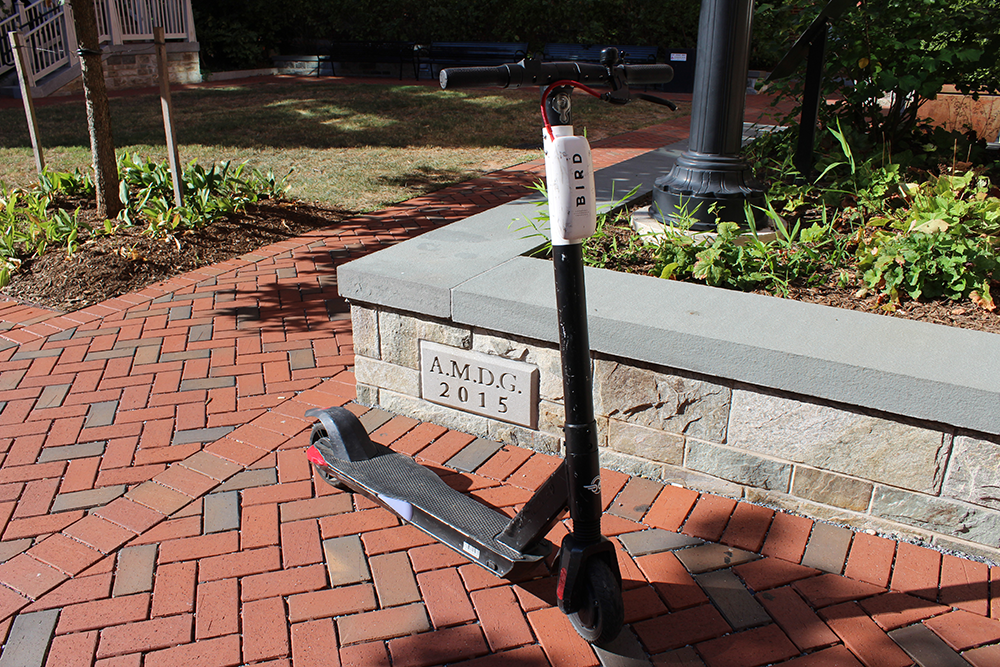A campaign for tougher electric scooter safety laws was reignited by a Georgetown resident this November, organizing with his fellow residents through the new Groups.io neighborhood listserv.
Edward Segal launched the petition and a corresponding website in May demanding that Mayor Muriel Bowser (D) and the D.C. Council pass and enforce laws banning scooters from sidewalks and penalizing riders for unsafe use of scooters, but the petition has only garnered 188 of its 1000 signature goal at the time of publication. Segal, who has lived in Washington, D.C., on and off for 30 years, is currently a public relations consultant, gas safety advocate, public speaker and author.

Segal’s concerns and petition center around unsafe and improper usage of the scooters by riders, according to Segal.
“I am not against e-scooter riders or drivers. I am against how they are driving dangerously and hazardously and how they are putting the lives and safety of pedestrians and car drivers in jeopardy,” Segal said in an interview with The Hoya.
The District Department of Transportation proposed new rules for electric scooters for 2020 in a statement Sept. 25, limiting the number of companies authorized to operate in the city but ultimately allowing for an increase in the number of devices each company can deploy. The regulations were released for public comment from Sept. 25 to Oct. 30.
The new regulations would mean there could be up to 10,000 more scooters in D.C. as soon as January, which worries residents like Segal. His petition asks the D.C. Council to implement new penalties, including stiff fines for riders who do not wear helmets, use cell phones or wear headphones while riding. Segal also proposed a $100 fine for every rider who leaves their electric scooter in an unsafe place on sidewalks or streets, according to the petition.
Bikes and scooters are already barred from sidewalks in D.C.’s downtown central business district around the White House, but Segal wants this rule to extend throughout the rest of the city, too.
Segal noted that Georgetown’s brick sidewalks and cobblestone streets make for unsafe riding.
“Our infrastructure is bad enough as it is and is not conducive to new technologies,” he said. “Some of the sidewalks are uneven, they are barely safe to walk on. I see people tripping all the time, and then to ride an electric vehicle on top of that — it’s adding danger upon danger upon danger, and it’s simply not safe.”
Other District residents outside of Georgetown are concerned about scooter safety as well. D.C. Councilmember Mary Cheh (D-Ward 3) chaired a D.C. Council hearing Nov. 4 on dockless vehicles. The hearing addressed electric scooter regulation and safety in the city and expanded on the Electric Mobility Devices Amendment Act of 2019 introduced by Cheh and other councilmembers June 25.
During the hearing, Cheh confirmed that a proposed ban on overnight electric scooter use from 10 p.m. to 4 a.m. would be taken off the table after advocates argued for the importance of late-night dockless vehicle usage.
Cheh has spearheaded a project to add parking spots for scooters across D.C. to keep sidewalks clear, which gained funding this fiscal year beginning in October 2019.
Cheh agreed with Segal that scooters pose a public safety hazard when left on sidewalks.
“This legislation is a broad and comprehensive approach to establishing common sense electric scooter and electric bike rules that will help keep our streets and sidewalks safe while also enabling these services to continue to operate in the District,” Cheh wrote in an email to The Hoya.
Electric scooters were first introduced in spring 2018, making D.C. one of the first U.S. cities to allow the dockless vehicles. Scooter usage in the city has increased in the past year, with nearly one in six residents having used them in the past year, according to The Washington Post.
The newness and widespread use of scooters necessitated legislation, according to Cheh.
“We have established bike culture in the District, but, because this technology is relatively new, we don’t have a safe electric scooter culture—resulting in many users neglecting to follow important safety rules,” Cheh wrote.
Segal advocated for more severe consequences for reckless riders.
“They should be arrested or taken in,” Segal said. “I’m for anything that will improve the environment, lessen the carbon footprint and make it more easy and convenient for people to get around the city but not at the expense of the safety of pedestrians and drivers.”





















Egor Lukanov • Nov 16, 2019 at 11:54 pm
When the mainstream media ignores these crucial issues, it’s good to see The Hoya take charge! Very insightful article.
Genny Chekerdjian • Nov 8, 2019 at 10:00 pm
Great article and insight into the complex issues dealing with the electric scooter. While the article is very well written, I am morally compelled to disagree with Segal due to large range of opportunities and possibilities this mode of transportation introduces to the residents of DC.
Paul Raphael • Nov 9, 2019 at 5:59 pm
Wonderful and insightful article. Thank you Hoya for writing on this topical issue.